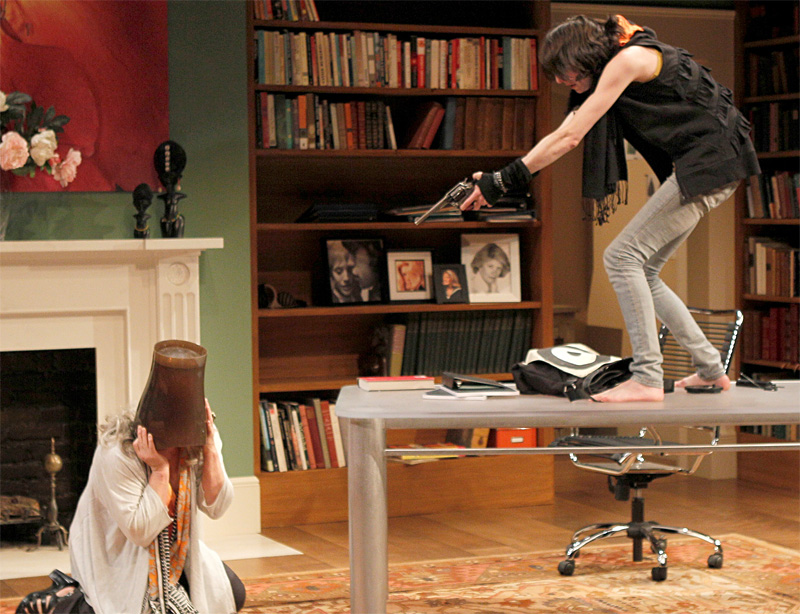“Feminism needs theatricality, or it’s just one big pompous whinge.” Thus speaks Margot Mason (Suzy Hunt), the white-maned, tyrannical windbag at the center of The Female of the Species. Or rather, roars. This imperious, pronouncement-spewing literary icon has made a career of telling women what’s what in mental whiplash–inducing books from Madame Ovary to The Cerebral Vagina to The Islamic Vagina to Men Are Awful. A little writer’s block isn’t going to stop her from issuing another best-selling dictate to her devotees.
Into Margot’s glamorously bookish yet sterile country house—one of the loveliest sets in recent memory—enters Molly Rivers (Renata Friedman, no relation), an endlessly gangly, unpredictable goth waif with a 10-ton grudge. After some admiring banter, she takes Margot hostage and ties her to the desk, trussed and mouth-plugged like a suckling pig. The setup was undoubtedly inspired by the 2000 assault of feminist icon Germaine Greer in her English country home by an obsessed 19-year-old student. (When Female debuted in London two years ago, playwright Joanna Murray-Smith denied she was appropriating Greer’s life; then the two Aussies began a very amusing mudslinging contest in the press.)
Salvation appears to be at hand when Margot’s disappointingly conventional daughter Tess (Morgan Rowe) shows up. After hilariously misperceiving her mother to be in some sort of voluntary, masochistic bondage exercise, Tess concludes that Molly’s resentment of Margot is justified. (Molly’s mother jumped under a train clutching one of Margot’s books.) Also, Tess takes the opportunity to demand of her hog-tied mother, “Who’s my father?”
For the remainder of the play, Margot is everyone’s favorite target—bound and scorned, but more than capable of defending herself. It’s less clear, however, if feminism itself is what Murray-Smith’s attacking. Rather, this farcical five-alarm bonfire of the academy seems more broadly directed at the commodifying of intellect. Margot typifies the publish-or-perish compulsion of pop scholars to issue decrees as frequently as Prada changes its hemlines. Post-structuralism, higher education, and pedagogies of many hues also suffer collateral damage. So, too, in the figure of Molly, are needy, credulous fans ridiculed for putting such autocratic buffoons on pedestals. The play’s not a philosophical treatise, but a dark, often scrumptiously venomous comedy.
Director Allison Narver ratchets up the hysteria in ACT’s Falls Theatre, where the audience can see the whole proscenium stage, wittily outfitted by Robert A. Dahlstrom in towering oak bookcases, a leather fainting couch, a Warhol knockoff, and a pseudo–O’Keefe flower. Her cast achieves expressive nuance that would be diminished in the round in ACT’s other space. (Even so, I missed some lines due to audience laughter and/or my own slow brain, so I saw the show a second time.) While the great majority of zingers are readily accessible (Margot: “I am old. I remember when a Brazilian was a person”), some are pretty darned esoteric—in-jokes for the critical-theory set. Of the daddy of deconstruction, Margot tells Tess: “Derrida gave you your first solids!”
Men are gradually added to the caustic mix: Tess’ thick-headed husband Bryan (Paul Morgan Stetler), taxi driver Frank (Tim Hyland), and Margot’s publisher Theo (Mark Chamberlin). Life is undeniably better with them than without, albeit infinitely more complicated.
Hunt has the showiest role, and her performance leans heavily on scowl, pout, and gloat. But being tied to the desk affords her some amusing physical humor. Friedman radiates trembling, tight-coiled exhilaration as the hostage-taker. Rowe is quite funny as an exhausted wife and mother who’s walked off the job. Her Wellington-kicking, slow-motion tantrum is a comic highlight in the play. The power dynamic is marvelous as these two younger women alternately ally against Margot like sisters and compete for her approval like daughters.
During my second viewing of Female, the cast also showed its professionalism when a glass bottle unexpectedly and dangerously broke onstage. With one actress barefoot, all the performers adjusted their blocking for the next hour and figured out natural-looking ways to get the mess cleaned up. (There is no intermission in the 100-minute play.) Afterward, audience members didn’t realize the breakage wasn’t scripted.
Less fixable is the character of Margot, a truculent maypole around whom the five other, more likeable characters weave. While they all change organically and believably over the play’s span, Margot remains something of a cartoon figure.
In the end, though, Molly commandeers the play, stating her impassioned credo thusly: “Ideology denies the true, strange beauty of human experience.” Whereupon she gets a book contract.








